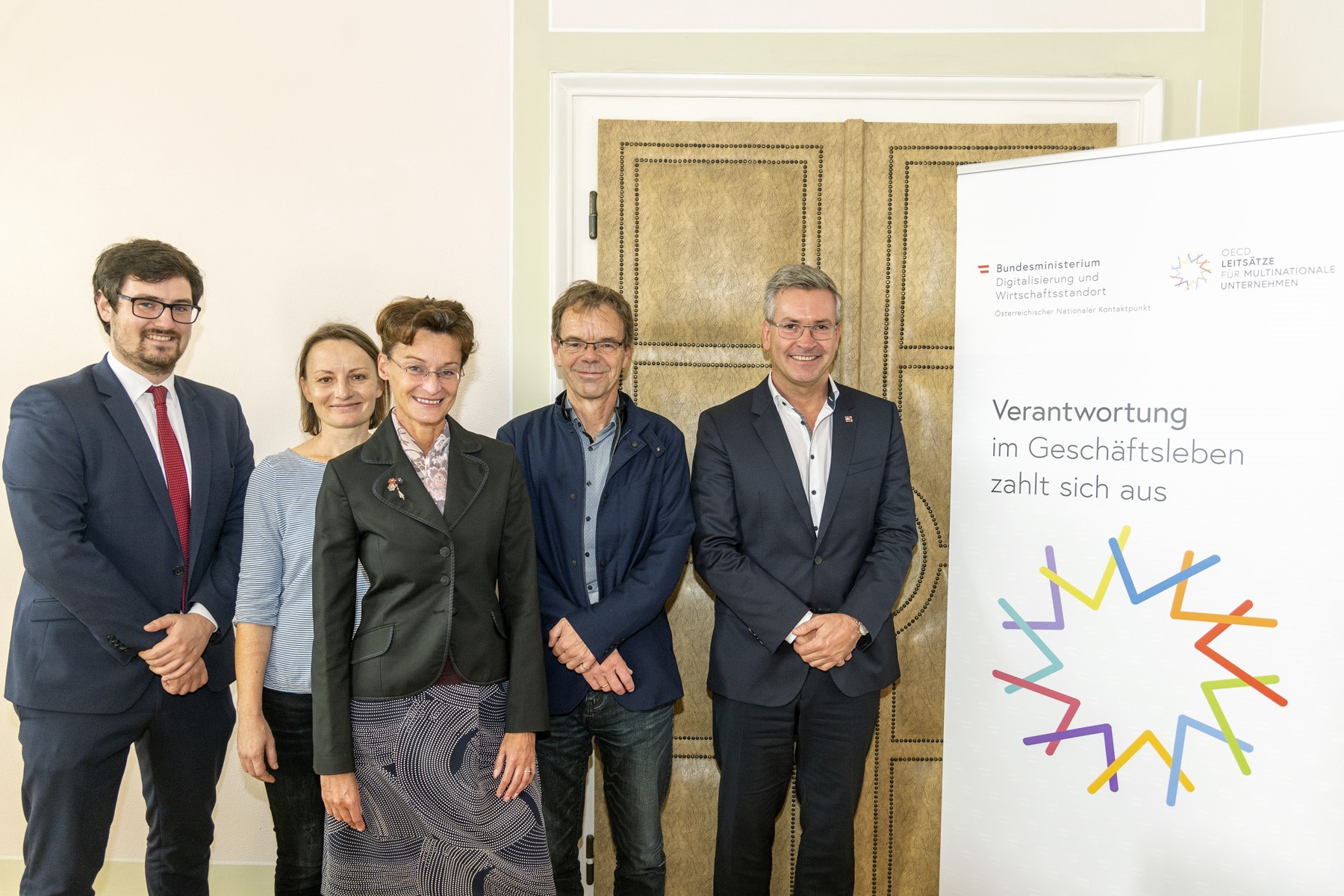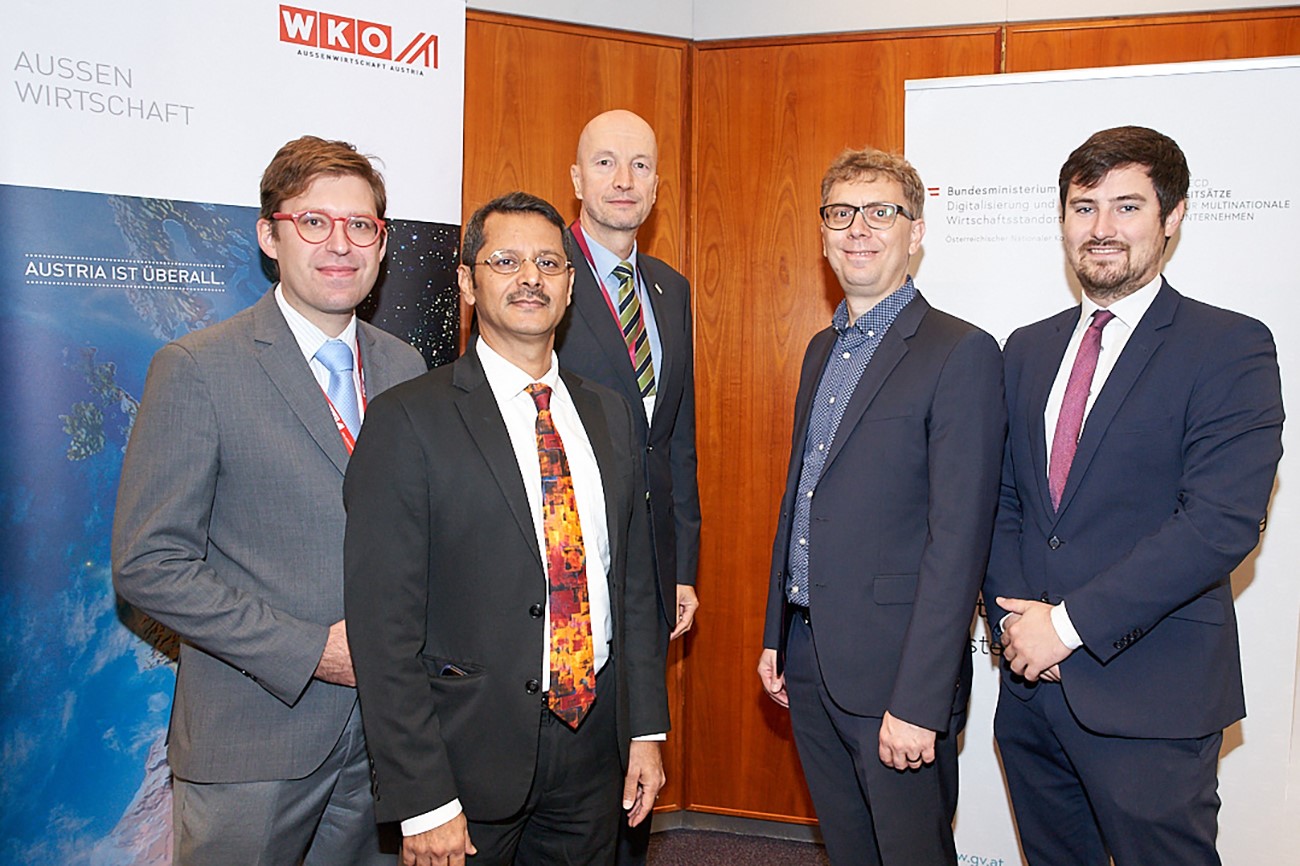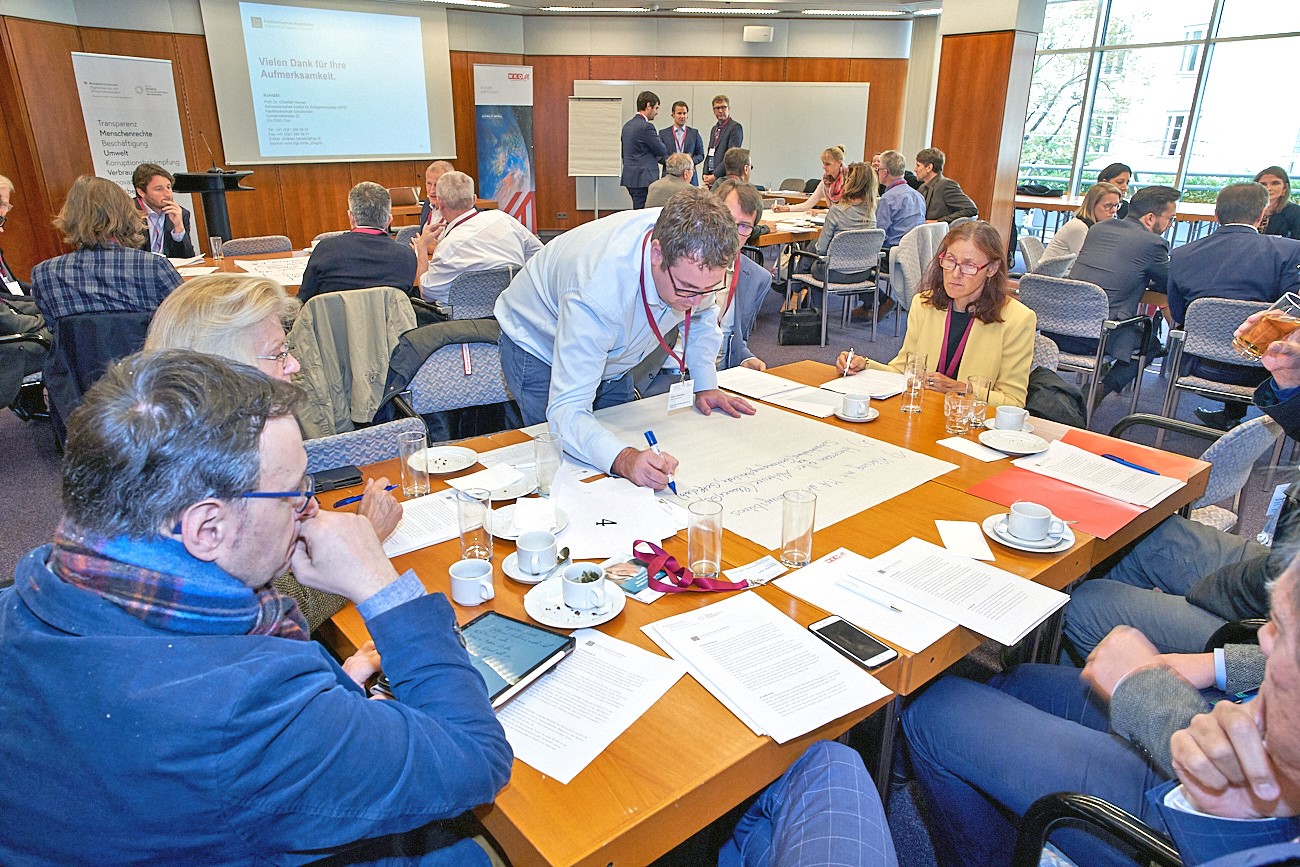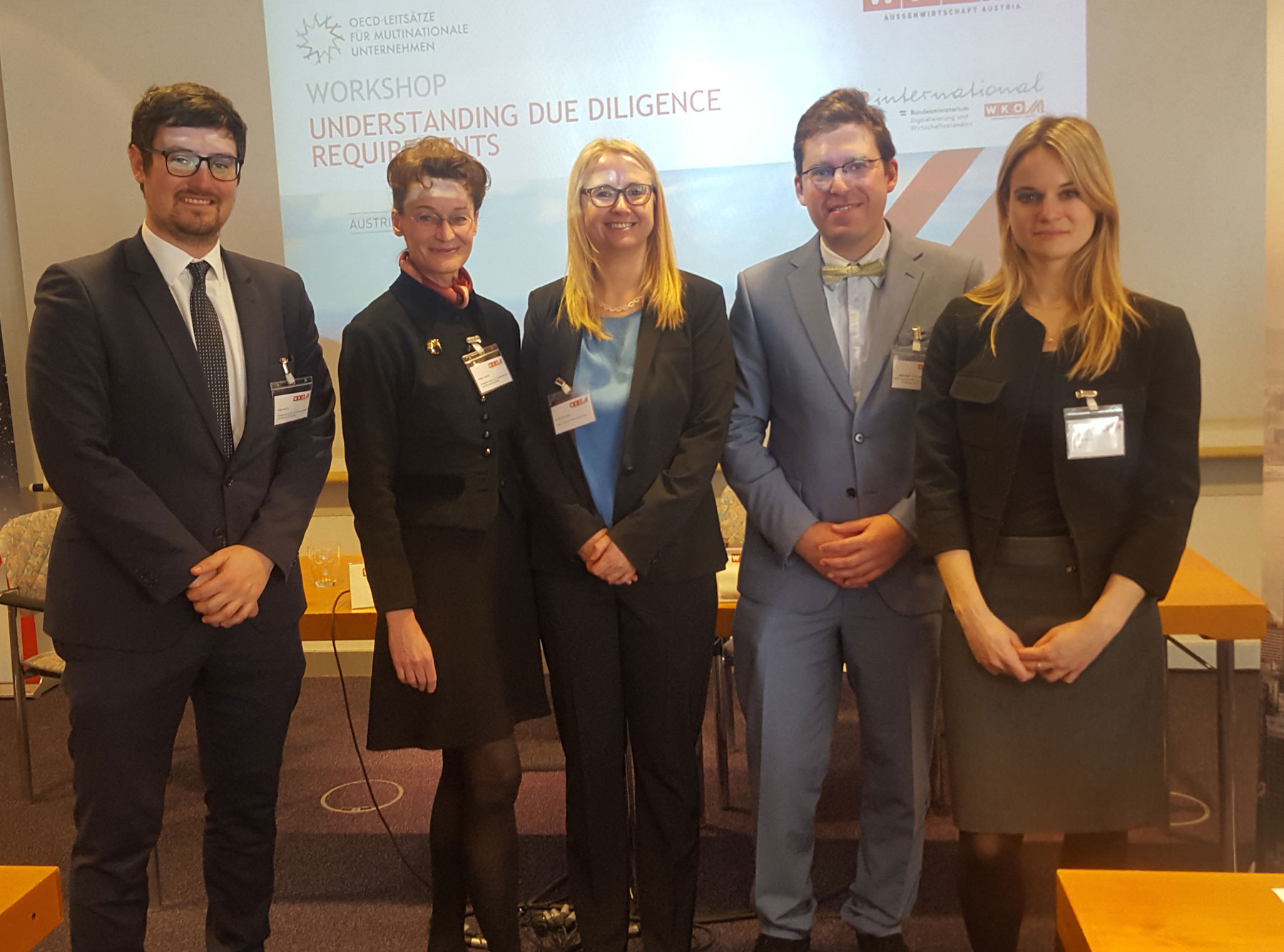Current Events
The Austrian NCP organises three or four expert talks and discussion panels annually. It also proactively participates in stakeholder events on responsible business conduct. Below are listed the current events scheduled by the Austrian NCP.
Priority in 2020 – Digitalisation and entrepreneurial responsibility – the role of the OECD Guidelines
The Austrian NCP has dedicated 2020 to a special project focusing on the mutual effects of digital transformation and entrepreneurial responsibility. For more information on the project and scheduled events see: “Digitalisation and entrepreneurial responsibility – the role of the OECD Guidelines”.
Kick-off event on “Digitalisation and entrepreneurial responsibility – the role of the OECD Guidelines” on 27 February 2020.
In response to the covid-19 crisis, the events organised by the Austrian NCP have been postponed to the second half of 2020.
OECD Global Forum on Responsible Business Conduct 2020, 19 May and 17 June 2020
The annual “OECD Global Forum on Responsible Business Conduct” (GFRBC) for 2020 was held on 19 May and 17 June 2020, for the first time solely in virtual form. It involved an exchange between governments and stakeholders, including business representatives, trade unions, members of the civil society and academia, on subjects that have a bearing on responsible business conduct. On 19 May, the focus was on covid-19 and entrepreneurial responsibility. Participants discussed, i.a., how governments and businesses can use RBC principles to set up resilient supply chains.
On June 17, the second part of the annual OECD Global Forum on Responsible Business Conduct (GFRBC) took place, which was held entirely online due to the COVID-19 crisis. The main topic was Access to Remedy and the 20th anniversary of the existence of the National Contact Points as an integrated dialogue and dispute settlement mechanism of the OECD Guidelines for Multinational Enterprises. All other documents and information are available at https://mneguidelines.oecd.org/global-forum/.
Previous events
In 2019
Workshop on "How to use the OECD Due Diligence Guidance" on 21 February 2019
In 2018
Discussion on "Digitalisation and global responsibility", on 11 June 2018
Roundtable on “Active participation in shaping global responsibility – how works councils can use ways and means to contribute”, on 22 October 2019
On 22 October 2019, the Austrian National Contact Point for the OECD Guidelines (Austrian NCP) invited members of works councils and delegates from the work force of internationally active businesses to attend a roundtable to explore ways and means for labour delegates to participate in global entrepreneurial responsibility and discuss practical applications.
Eckhard Voss, an executive of wmp consult, commenced his motivational speech highlighting the importance of global framework agreements and the practical value of due diligence. He was followed by Hermann Soggeberg, chairman of the Unilever Germany group works council and of the Unilever Europe works council, who demonstrated how labour representatives can actively contribute to shaping central sustainability and the implementation of global responsibility at the works level. The roundtable was concluded by an exchange between the 15 participants.

"Clean business practices pay – tools and strategies to successfully combat risks of corruption in international trade”, on 7 October 2019
The Austrian National Contact Point for the OECD Guidelines combined with Advantage Austria (the international trade department of the Austrian Federal Economic Chamber) and the International Anti-Corruption Academy IACA to organise a workshop on 7 October 2019. Using good practice examples, it was demonstrated to businesses how to pre-empt the risk of corruption in international business transactions.
Pawan Kumar Sinha, director of the academic side of IACA, recommended that businesses join forces to act against corruptive practices whenever they find themselves in markets with a high risk of corruption.
Christian Hauser from the Institute for Entrepreneurship at the University of Applied Sciences of the Grisons enumerated key factors that raise the corruption risk for businesses, such as the use of local agents. Major countermeasures would be contact points for whistle-blowers and special employee training.
During the concluding deep dive, participants went through four cases to learn how to effectively combat corrupt business practices, discussing them at the plenary follow-up.


Foto ICEP
Smart stakeholder engagement – entrepreneurial responsibility in the digital age, on 8 April 2019 at the Federal Ministry for Digital and Economic Affairs
Digital transformation and responsible business conduct were the focus of the information and networking event held by the Austrian National Contact Point for the OECD Guidelines in the Tapestry Chamber of the Federal Ministry for Digital and Economic Affairs on the evening of 8 April 2019. Cynthia Eva Zimmermann, Head of DG III European Union and International Market Strategies, in welcoming attendants emphasised the importance of entrepreneurial responsibility as a key competitive factor for Austrian business in a global market, elucidating that in order to support businesses in accepting their entrepreneurial responsibility, the new Austrian international trade strategy aims to strengthen the Austrian NCP as a one-stop shop.
Christine Kaufmann, professor of law at the University of Zurich and, since January 2019, chair of the OECD Working Party on Responsible Business Conduct, outlined in her keynote speech how the OECD Guidelines can help to cope with the challenges attendant to digitalisation. In his keynote speech, John Aston, stakeholder engagement expert, illustrated the use of new technologies to involve stakeholder groups through developing an internet site. Manfred Schekulin from the Ministry then guided the panellists through a discussion of opportunities and limits of digital technologies in the context of responsible business conduct.
The concluding deep dive was used by Adele Tharani (Community Relations and Development, OMV), Wolfgang Kraus (Senior Associate, IPIECA) and John Aston, based on good practice examples, to point out to the 60 or so participants from business, politics and civil society the challenges in setting up successful stakeholder relationships in threshold and less developed countries. They agreed that unknown structures, inadequately formalised relations between local stakeholder groups, private businesses and government agencies, and lack of a dialogue culture require an accurate knowledge of the market, sensitivity and local presence.

Workshop on how to use the OECD Due Diligence Guidance, on 21 February 2019
On 21 February 2019, Advantage Austria, the international trade department of the Austrian Federal Economic Chamber, jointly with the Austrian National Contact Point (NCP) invited enterprises to attend a workshop with Barbara Bijelic, a legal expert on responsible business conduct with the OECD Secretariat who contributed to the Guidance, introducing the OECD Due Diligence Guidance and discussing with Heidrun Schmid from OeKB the relevance of the due diligence in granting publicly funded export loans.
Over the past years, the OECD developed guidelines for carrying out due diligence in specific sectors – petroleum, textiles, mining, agriculture and the financial sector. Barbara Bijelic pointed out that the latest guideline aims to help businesses in all sectors to address risks related to the environment, staff, consumers, human rights and corruption.
Heidrun Schmid provided a detailed description of the due diligence procedure carried out by OeKB for granting publicly funded export loans. All transactions for which an application for an export guarantee is filed are checked by OeKB on behalf of the Ministry of Finance for their environmental and social impacts. Projects that involve major investment goods are checked in line with international standards (OECD Common Approaches) which ensure that all bidders from OECD countries need to comply with the same competitive terms. When projects are outside the OECD Common Approaches, OeKB decides along the criteria of size, location and sector whether further checks are necessary.
In conclusion the 40 participants of the workshop discussed with Barbara Bijelic the first steps of holding a due diligence, using various due diligence aspects such as prioritising risks and the inclusion of stakeholders.

Expert meeting on "OECD recommendations on due diligence – practical expectations to be met by enterprises", on 21 February 2019
In the afternoon of 21 February 2019, the Austrian National Contact Point invited members of the steering committee and representatives of federal ministries to meet Barbara Bijelic, legal expert on responsible business conduct with the OECD Secretariat, who had contributed to the OECD Guidance on due diligence.
Barbara Bijelic introduced the guideline and discussed experiences and expectations with the 17 participants – such as the role of governments in creating a beneficial environment for responsible business conduct. She emphasised the importance of developing coherence through cooperation with stakeholders in business, labour, civil society, the general public, internal government structures and other governments.
Discussion on "Digitalisation and global responsibility", on 11 June 2018
Blockchain, the Internet of Things or Big Data are considered as "game changers" for more transparency and flexibility in the supply chain. According to the speakers, digital technologies could make a significant contribution to identify risks in upstream supply chains.
Transparency becomes a key element in the supply chain: "Not only localising products, but being able to trace them along the entire supply chain is becoming a key element in supply chain management," emphasised Christian Friesl, Head of Education and Society of the Federation of Austrian Industries. Ensuring real supply chain transparency is finally possible through the help of digital technologies.
Current developments: Transparency, sustainability, environmental protection and combating corruption will also be considered in the 2018 External Trade Strategy, which is currently developed, stated Bernadette Marianne Gierlinger, Director General for External Trade Policy and European Integration in the Federal Ministry for Digital and Economic Affairs. Specific attention is given to the opportunities being brought in by digitalisation. Director General Gierlinger also referred to the new OECD Due Diligence Guidance for Responsible Business Conduct, which provides practical support to companies across all industries on due diligence along the entire supply chain.
Increased supplier visibility through digital technologies: "Sustainability problems usually do not arise with direct suppliers, but in the upstream supply chain," said Martin Schleper, Sustainable Operations Management at the University of Sussex. In supply chain due diligence and risk identification, companies usually have to rely on information provided from their first tier suppliers. Especially for small and medium-sized enterprises it is often not possible to receive information from upstream suppliers due to low purchasing volumes. Digital technologies such as blockchain, as well as social media and big data can increase the visibility of suppliers and help to better identify risks in the supply chain", said Schleper.
Digital technologies being tested: Many companies are currently testing whether digital technologies can be used to verify that their supply chains are free from forced labour, human trafficking or corruption, explained Tara Norton, Managing Director of the international consultancy BSR. Projects include a joint venture between the Danish transport and logistics company Maersk and IBM, the 'bean-to-cup' blockchain initiative from the coffee company Starbucks with select coffee farmers in Costa Rica, Colombia and Rwanda or a project by the consumer goods company Unilever and the British supermarket Sainsbury's with tea farmers in Malawi.
Unlocking the Potential of Digitalisation: Achieving sustainability targets would not be possible without digitalisation, said Manfred Schekulin, Head of Export and Investment Policy and Chairman of the OECD Investment Committee, in the discussion with Tara Norton, BSR, Martin Schleper, University of Sussex and Michaela Kegel, Compliance and Sustainability Services at KPMG. Digitalisation could help to work through standards such as the OECD Guidelines in a structured manner, to harmonise the large number of codes of conduct, or to predict short-term political or labour law risks using algorithms, said Michaela Kegel. However, decision-making and trust in the accuracy of information cannot be replaced by digital applications, the panelists agreed.
Contact Information
Mario Micelli
Austrian NCP for the OECD Guidelines for Multinational Enterprises
Federal Ministry of Labour and Economy
E-Mail: NCP-Austria@bmaw.gv.at
Telephone: (+43) 1 711 00-805240 or 805050
Fax: (+43) 1 711 00-8045050
http://www.oecd-leitsaetze.at/